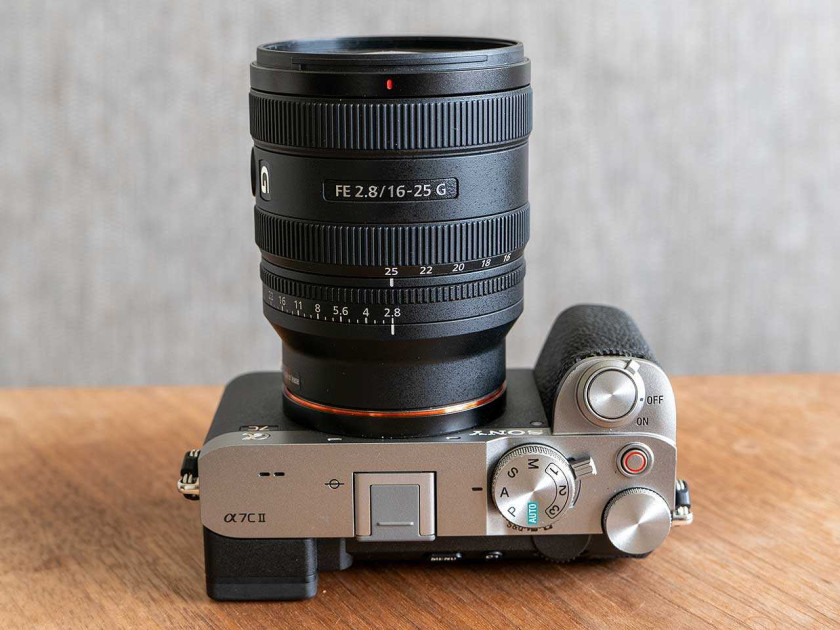
[ad_1]
Introduction
The Sony FE 16-25mm F2.8 G (SEL2450G) is a compact, lightweight and fast wide-angle zoom lens for Sony Alpha full-frame E-mount mirrorless cameras. It will also work with APS-C sensor cameras with an effective increase in focal length to 24-37.5mm due to the 1.5x crop factor. The optical construction features 16 elements in 13 groups including three ED (extra-low dispersion) elements and four standard aspherical element that include one ED Aspherical glass element.It has a near-circular 11-blade diaphragm which creates an attractive blur to the out-of-focus areas of the image, This dust and moisture resistant lens also has a fluorine coating on the front lens element to help prevent fingerprints and other contaminants.It offer a minimum focusing distance of 18cm / 0.59ft with a maximum magnification of 0.20x and incorporates two linear motors for fast and quiet auto-focusing.The Sony FE 16-25mm F2.8 G lens will be available in April 2024 priced at £1250 / €1400 in the UK and Europe, respectively. It is made in Vietnam.
Ease of Use
Weighing in at just 409g /14.5 oz. and measuring 9.23cm in length, the hybrid metal and plastic bodied Sony FE 16-25mm F2.8 G is very light and compact for a fast wide-angle zoom lens.
It proved to be a perfectly balanced partner to the the Alpha A7C II camera that we tested it with, as shown in the photos below.
It’s significantly lighter than all of its main rivals, which include amongst others the Sony FE 16-35mm F2.8 GM II (547g / 19.3oz), Sony FE 12-24mm F2.8 GM (847grams / 29.9oz) and the Sony FE 12-24mm F4 G (560g / 19.75oz).
Third-party alternatives include the very similar Sigma 16-28mm F2.8 DG DN (450g / 15.9oz.), Tamron 17-28mm F2.8 Di III RXD (420g / 14.82oz.)and the lighter but longer Tamron 20-40mm F/2.8 Di III VXD (365g / 12.88oz).
It’s important to note that his new lens does extend by an additional 1cm when zoomed from the maximum 25mm focal length to the 16mm focal length.
The overall build quality is very good, which is something of a relief given the high price-tag, with this very modern lens utilizing a hybrid metal and plastic construction.
This lens has a sealed dust and moisture resistant design utilising silicon seals around all the buttons and switches and a rubber gasket around the lens mount, which makes it well-suited to life in both the field and the studio.
There’s also a a fluorine coating on the front lens element to help repel water, oil, and any other contaminants, as well as making it easier to clean.
It has a metal lens mount and accepts 67mm filters via metal threads.
The Sony FE 16-25mm f/2.8 GM has a round Focus Hold Button which by default keeps the lens locked to the current focusing distance, useful if you’re auto-focusing and don’t want the lens to try and find focus again.
An alternative function can also be assigned to this button through the camera’s custom settings.
There is a ridged focus ring at the end of the lens. Manual focusing is possible by using the dedicated AF/MF switch to toggle between AF and MF.
There are no hard stops at the ends of the range, making it harder to set focus at infinity. Polariser users should be pleased that the 67mm filter thread doesn’t rotate on focus.
The lens utilizes two Linear Motors for satisfyingly fast, smooth and precise auto-focusing, and it’s very quiet in operation making it well-suited to shooting video.
An internal focusing design ensures that the overall lens length remains constant during focusing.
When it comes to auto-focusing, this lens is a quick performer, taking around 0.15 second to lock onto the subject when mounted on the Sony Alpha A7C II that we tested it with.
We didn’t experience any “hunting” at all, either in good or bad light, with the lens accurately focusing virtually all of the time.
It’s also a very quiet performer, which makes this lens equally well-suited to both video recording and more candid stills shooting.
This lens has a dedicated aperture ring with 1/3EV stops ranging from F2.8 to F22.
It can be switched between smooth and notched rotation using the dedicated Click On/Off switch on the bottom of the lens barrel.
There’s also an A (Auto) setting if you want to let the camera take control of the aperture.
The zoom ring sits in the middle of the aperture and focusing rings and rotates through approximately 80 degrees. It has five different focal length markings – 16, 18, 20, 22 and 25 mm.
This lens does not feature optical image stabilisation, so it relies on the camera body’s own built-in stabilisation, which is fine unless you’re an owner of an early Sony Alpha camera.
The Sony FE 16-25mm F2.8 G lens is supplied with a plastic petal-shaped lens hood (ALC-SH178) which rotates through 90 degrees then snaps into place (there’s no lock button as on some more premium hoods). There’s no case included with this lens.
Focal Range
The 16mm focal length provides an angle of view of 107 degrees.
16mm
The 25mm focal length provides an angle of view of 82 degrees.
25mm
Chromatic Aberrations
Chromatic aberrations, typically seen as purple or blue fringes along contrasty edges, are not a problem for the Sony FE 16-25mm F2.8 G lens, even in areas of very high contrast.
16mm
25mm
Vignetting
With the lens set to its maximum aperture of f/2.8, there is some significant light fall-off in the corners, requiring you to stop down by at least 3 f-stops to completely prevent it.
16mm / JPEG
16mm / RAW
25mm / JPEG
25mm / RAW
Distortion
The Sony FE 16-25mm F2.8 G exhibits some barrel and pincushion distortion in the JPEG files, as you can see in the photos below, which will you need to correct in post-processing.
Note that Distortion Compensation is always set to Auto in-camera – the menu option is permanently disabled.
This is a good thing given the huge amount of distortion that is present if you open the RAW files in software that doesn’t have the correct lens profile, especially at the wide end of the zoom range.
16mm / JPEG
16mm / RAW
25mm / JPEG
25mm / RAW
Macro
The Sony FE 16-25mm F2.8 G offers very good close-up performance for a standard zoom lens, with a close focus point of 18cm / 0.59ft from the sensor plane at 16mm and 24cm / 0.79ft at 25mm when auto-focusing. It offers a maximum magnification of 0.20x when auto-focusing and 0.23x when manual focusing.
Bokeh
Bokeh is a word used for the out-of-focus areas of a photograph, and is usually described in qualitative terms, such as smooth / creamy / harsh etc.
Sony have paid close attention to this aspect of lens use, employing an 11-segment diaphragm with rounded blades for more pleasing bokeh.
In our view, their efforts have been successful for a wide-angle zoom lens – see the examples below to judge for yourself.
Sharpness
In order to show you how sharp the Sony FE 16-25mm F2.8 G lens is, we are providing 100% crops on the following pages.
[ad_2]






